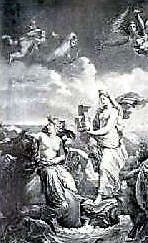
This is a 'What if...' novel. What if a girl commits man-slaughter defending herself against rape, in the back lane? The author's logic assures us lives will be blighted. The girl herself leaves the victim with a life of her own lost forever.
The consequences of the fateful encounter are clearly thought and simply
written. One is inspired to write one's own analytic novel. But it is not so
easy as it looks.
A comparable work is Kurt Vonnegut's Dead-eye Dick. A boy takes an
'impossible' aim, that goes off, at a pregnant woman.
I have a feeling that Joseph Heller's Something Happened tried to emulate his genial fireside chat. Unlike Catch 22, it couldnt compel my attention. Vonnegut's easy-going manner is far from effortless.
Likewise, Bernice Rubens relies on imagination rather than special knowledge to tell her tale. As Albert Einstein said, 'Imagination is more important than knowledge.' The novelist merely draws on her home territory of war-time working-class Wales. Perhaps, that's how the story gets its leavening of chirpy quips, its ready wit in adversity.
Rubens doesnt turn her novel into a stand-up comedy routine, like Mr Wakefield's Crusade, which tries too hard to be funny.
Reading a novel is a matching of wits with the author. Some writers are like
sparring partners, dealing the reader all sorts of feints in the plot before
delivering surprises, as complete as a knock-out.
This doesnt seem to be Bernice Rubens' purpose here. Rather, windows of
opportunity open for the plot to go in new directions. But doors are opened on
other paths. The unexpected does happen but one can see that human nature
really demanded it.
Bronwen, the man-killer ( literally ), has an aunt who says: 'The Welsh are different...A very hospitable people they are. Quite different from the English.' But the communal life of the terrace seems to be no more than an example of working class solidarity.
And Bronwen's narration betrays that her mam and dad and auntie are the only
important considerations -- at least until they are no longer there. Her
horizons are as tightly bound as any middle class English nuclear family's.
She fears their death more than her own. Hence, the power of her sentimental
dependence, under the usual British diffidence.
Bronwen wins scholarships to become a teacher. She claims she loves her work but talks later of it, as a routine. Indeed, it is as insulated from her home life, as her father's blue-collar job.
The absence of culture and the social boredom resemble the episode about
what to do on Sunday, from Hancock's Half Hour.
Listening to the King's radio message at Christmas is religiously observed. The
king's there by divine right, Dad says. ( The monarchy was restored on the
understanding it was not there by divine right. )
Still, Rubens may have been rubbing our noses in the fact that, British
subjects had something more important than themselves to look up to, however
deficient.
Talking about screaming for help, Bronwen comments: 'And perhaps in those days,
someone would have come to my aid.' In this throw-away remark, she consigns
Britain circa 1995 to the dust-bin of history.
Bronwen's lacking presence of mind is plausibly explained. But it remains a
point against her.
Learning by our and others' mistakes is our only hope for humanity's gradual
over-coming even the worst of predicaments.
Faith in British justice is all too plausibly shaken.
Whether or not the courts judge guilty unfortunates, others may judge them for
the ill effect they had on their lives. This happens in the novel, not to give
away the plot. But the judger does comparable harm, just by ill judgement. This
was not an innocent mistake, if prejudice and vanity are culpable.
In part two, after the war, royalty-worship vanishes, replaced, maybe, by the heaven of an annual holiday in Spain. The reader is relieved of immediate apprehension for Bronwen's crime. The years now fairly sail along. Bronwen's brief bid for happiness, of her family if not herself, is rebelled against, by her own implacable body.
The generations of needle-working skill will die with Bronwen's mother. And the fate of the home-made wedding dress symbolises that is not all to be missed.
As the facts emerged, Bronwen came to feel for her assailant's frustration.
She believed no-one was to blame for the pile-up of misfortunes, resulting from
their collision in the back lane. She lays the chaos at God's door.
This is Job's complaint against a seemingly capricious God. Christ's mission is
echoed in Alexander Pope's attempt to justify the ways of God to man. As the
son of God, become man, the crucified Christ atones for man's suffering.
One might ask what good does that do?
God becomes responsible for his leadership. He is no longer the jealous
patriarch of the Old Testament. He is more like a democratic representative,
who recognises he has to be accountable to his creations.
A rigid barrier between heaven and earth, ruler and ruled, has been crossed. In
becoming man, God also shares His divinity with mankind. By the same token, the
created, to some extent, may become empowered as creators, free creatures.
A poem by Kingsley Amis, about a new approach needed, treats the Christian God rather like a politician, whose leadership has failed human history. There is a resentful challenge to try again, presumably on a Second Coming. It is rather like persecuting Christ all over again, by absolving ourselves of responsibility and blaming Him.
Such fatalism seems to be encouraged by the extreme doctrine that people cannot redeem themselves but must put their faith entirely in God. This might shut out a divine evolution of God's creatures, thru progress in realising responsible freedom.
Richard Lung